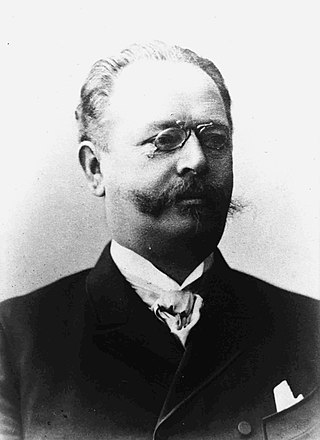Related Research Articles

Gustav Georg Friedrich Bohlen-Halbach since 1871 von Bohlen-Halbach was an American-born German diplomat, court master of ceremonies and minister resident for the Grand Duchy of Baden. His fifth son, Gustav Krupp von Bohlen und Halbach, married Bertha Krupp who served as president of the supervisory board of Krupp from 1908 to 1943.

The Province of Brandenburg was a province of Prussia from 1815 to 1945. Brandenburg was established in 1815 from the Kingdom of Prussia's core territory, comprised the bulk of the historic Margraviate of Brandenburg and the Lower Lusatia region, and became part of the German Empire in 1871. From 1918, Brandenburg was a province of the Free State of Prussia until Prussia was dissolved in 1945 after World War II, and replaced with reduced territory as the State of Brandenburg in East Germany, which was later dissolved in 1952. Following the reunification of Germany in 1990, Brandenburg was re-established as a federal state of Germany, becoming one of the new states.

Heinrich Ernst Göring was a German jurist and diplomat who served as colonial governor of German South West Africa. He was the father of five children including Hermann Göring, the Nazi leader and commander of the Luftwaffe.
Demesvar Delorme was a Haitian theoretician, writer, and politician. Born in Cap-Haïtien, he participated in Sylvain Salnave's failed rebellion against President Fabre Geffrard in 1865. After the fall of Geffrard and Salnave's election as President of Haiti in 1867, he was appointed Minister of External Relations and Minister of Public Education and Cults.

August Friedrich Wilhelm Keller, from 1906 Friedrich von Keller, was a German diplomat. He served as ambassador in Belgrade, Brussels, Buenos Aires and Ankara, and represented Germany at the Geneva Disarmament Conference in 1933.
John Aloysius Belton (1903–1968) was an Irish diplomat.
Alexandru Romalo (1890–1955) was a Romanian economist, politician, senator and diplomat. He was managing director of a Societăţii de Asigurare "Dacia", a Romanian reinsurance company. From 1 June 1940 to 15 October 1940 he was Romanian ambassador in Germany.
The German foreign office had a sizable network of diplomatic missions when Nazis came to power in 1933. While it was a deeply traditional and elitist organisation within the German civil service, it enthusiastically helped the Nazis prosecute an ambitious foreign policy.

Arvid Fredrik Taube was a Swedish aristocrat who served as the foreign minister between 1909 and 1911 and also, held various diplomatic posts.
Tobias C. Bringmann is a German historian and association official.
References
- ↑ (in German) Walter von Leers: Die Zöglinge der Ritterakademie zu Brandenburg a. H. 1705-1913. Hrsg.: Verein der ehemaligen Zöglinge der Ritterakademie zu Brandenburg a. H. I von IV, Zöglings-RA-No. 1402. Gedruckt im Selbstverlag bei der Buchdruckerei P. Niemann, Brandenburg, Belzig, Ludwigslust 1913, p. 319
- ↑ (in German) Tobias C. Bringmann: Handbuch der Diplomatie 1815–1963. Auswärtige Missionsschefs in Deutschland, 2001, ISBN 3110956845, p. 85.
- ↑ (in German) Hans Friedrich v. Ehrenkrook: Genealogisches Handbuch der Adeligen Häuser / A (Uradel) 1953. In: Dt. Adelsarchiv (Hrsg.): GHdA, von 1951 bis 2014. Band I, Nr. 5. C. A. Starke, 1953, ISSN 0435-2408, p. 75
- ↑ (in German) "Chroniknet entry". chroniknet.de.
- ↑ (in German) Tobias C. Bringmann: Handbuch der Diplomatie 1815–1963. Auswärtige Missionsschefs in Deutschland, 2001, ISBN 3110956845, p. 143.